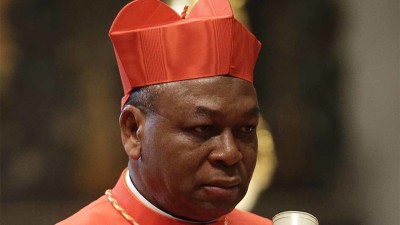
In the winter of 1976, John Cardinal Onaiyekan, a young Catholic priest aged 32 walked across the Great Hall of the Pontifical Urban University, Rome, holding in his hands the scroll of his doctorate degree in Biblical Theology, earned with full distinction, to the admiration of his professors and colleagues. Onaiyekan’s steady rise has been a product of divine providence. He was born into a very peasant family.
His father Bartholomew Onaiyekan was a subsistence farmer in Kabba who struggled hard to provide for the needs of his family. Onaiyekan always speaks of his father as an upright man who taught him that one could still have dignity even in the midst of daunting poverty. His mother, Joanna Onaiyekan was a petty trader, who sold salt and other condiments.
In the midst of his modest family upbringing, Onaiyekan was blessed with a fiery brain. He distinguished himself so much for his brilliance in primary school, that the white missionary priest in his Kabba hometown recommended him for a scholarship to Mount St. Michael Secondary School, Aliade, where he had his secondary education. For the five years of his secondary education, he consistently came tops in his class. The crowning point of his secondary education came in 1962 when he passed his WASSCE with distinctions in all his eight subjects. This brilliant performance was talked about in the whole of Northern Nigeria, and it earned him the scholarship of the Sardauna of Sokoto, Sir Ahmadu Bello, for his Higher School Certificate (HSC) in Kings College, Lagos. But Onaiyekan turned down the scholarship and opted for the Catholic Major Seminary in Ibadan, in pursuit of his priestly dream.
After two and a half years of philosophical studies in Ibadan (1963-65), Auguste Delisle, the French Canadian Holy Ghost prelate who was Bishop of Lokoja, sent Onaiyekan to the Pontifical Urban College in Rome, for his theological studies. On his return to Nigeria in 1969 he had earned a Bachelor’s degree and a Master’s degree in Sacred Theology. After his priestly ordination in August 1969, he worked for two years as a priest-schoolteacher and in 1971 he went back to Rome for advanced studies in theology. When he returned to Nigeria in 1976, he had earned a Licentiate Degree in Sacred Scriptures and a Doctorate Degree in Biblical Theology.
From 1977 to 1982, Onaiyekan taught Scripture and Fundamental Theology at his alma mater, Ss. Peter & Paul Catholic Major Seminary, Ibadan, until Pope John Paul II appointed him a bishop in November 1982 at the young age of 38. Even as a bishop, Onaiyekan’s engagement with the academia did not cease. He was one of the founding members of the Catholic Theological Association of Nigeria (CATHAN). He continued to develop his passion and research interests in biblical exploration, exegesis and hermeneutics. His brilliant articles appeared in reputable journals, both locally and internationally. He was also tapped at several moments to deliver lectures at high profile intellectual conferences at home and abroad, especially in universities. In African Catholic theological circles, Onaiyekan’s towering intellectual aptitude became a tour de force.
One could gauge Onaiyekan’s steady rise on the intellectual and ecclesiastical ladder through the many recognitions he received in the decade from 1980 to 1990. Pope John Paul II appointed him a member of the International Theological Commission for a period of five years (1980-1985). He was the only African nominee of this 30-member Commission, with members drawn from popular theological circles all over the world. He worked closely with Joseph Cardinal Ratzinger, the German theologian who was president of the commission, and later Pope Benedict XVI.
From 1981-1991 Pope John Paul II again tapped Onaiyekan to serve on the Methodist-Roman Catholic International Dialogue Commission, where he worked with many of the world’s leading Catholic and Methodist theologians. During those years, Onaiyekan also served on the Vatican’s General Secretariat of the Synod of Bishops, the body of experts that bear the responsibility of organising the continental meetings of bishops to discuss matters of faith and pastoral praxis in the Church. When the first African Synod of Bishops was held in Rome in April 1994, Onaiyekan was appointed by the Pope to act as Adjunct Rapporteur of the Synod.
In the last quarter of a century, Onaiyekan’s intellectual interests have spanned interfaith dialogue, ecumenism and exploring the faith – reason dimension of biblical theology. His membership of the Faith and Order Commission of the World Council of Churches (WCC) in Geneva, for a period of 15 years positioned him at a vantage point to understand the complexities of the burning theological issues in ecumenical cooperation among the different confessions in global Christendom. Among Onaiyekan’s published works include materials on Church-State relationship, interfaith dialogue in Africa, theology and praxis, and fundamentals of biblical theology.
In these past years, Onaiyekan has grown to become a historic reference point in matters of theology in an African context. As a result of his academic qualifications and experience, his expertise is regularly sought after in the international arena. As the Roman Catholic Cardinal Archbishop of Nigeria’s capital city, he also sits at the vital intersection of politics, religion and culture, and this position affords him the opportunity to provide the needed intellectual moral alignment to national issues. His giftedness for cutting edge multi-disciplinary engagements and crosscutting theological scholarship also make him a reservoir of tried and tested knowledge in many fields of human endeavour. Yet, in spite of all his laudable accomplishments, Onaiyekan remains a rare breed. Father George Ehusani describes him as “a man of amazing simplicity, humility and modesty; down-to-earth and easily approachable.”
It is for this reason that he judges the quality of a life well lived as one of humble service to God and humanity. As one of Nigeria’s high profile spiritual leaders, Onaiyekan is a model of emulation to millions of people today.
GUARDIAN
END

Indeed a man worthy to be emulated